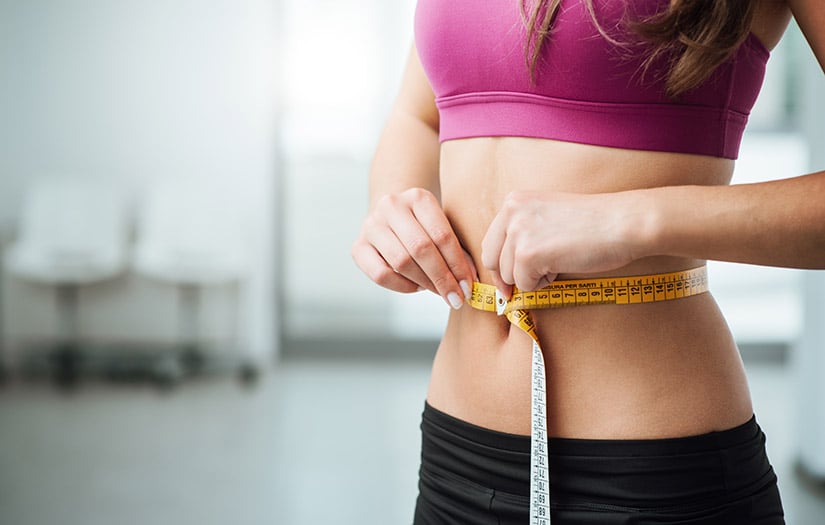I’ve had many a client come into their workout in a panic because they seemingly gained 3-5 pounds overnight. The conversation goes something like this: “I can’t believe I put on 3 extra pounds yesterday,” says the client. “What do you mean?” I ask. They reply: “Last night, I ate Mexican food, and I was 3 pounds heavier on the scale when I woke up this morning!”If you’ve ever experienced a mysterious and seemingly overnight weight gain, don’t panic! It’s probably just water weight. Water weight gain shows up in the form of what you might call “bloating.”
You might notice it around your midsection, or notice puffiness in your feet, ankles, or even your fingers after a short period of over-indulging (examples: a big meal, alcoholic beverages, some junk food, or enjoying all-the-things while on vacation). The good news is: it will go away, and there is something that you can do about it.
Keeping these things in mind can help you lose weight fast.
If you are a weight loss specialist and want to learn how to reassure clients about water weight, this blog is also relevant to you!
What Causes Water Weight Gain?
It’s normal for your weight to fluctuate up to 5 pounds daily due to water weight, but what causes it?
Too Much Sodium
The most common cause of bloating from excess water weight is an imbalance in your salt/water ratio (i.e., too much sodium and not enough water). This imbalance causes you to retain extra fluid in your tissues or between blood vessels.
Physical Inactivity
Extended periods seated (hello, work from home) can cause water to “pool” in your lower extremities. You might notice that your feet and ankles are a little swollen at the end of a long day of sitting or even standing in one position.
Hormone Imbalance
It’s true for women especially that changes in hormones, due to menstruation and pregnancy, can cause the tissues to retain excess water. Thankfully, this type of water weight gain will usually be resolved on its own. Chronic fluid retention, the kind that doesn’t go away, could be an indicator of hormone imbalances that need medical attention.
Too Many Carbs
Carbohydrates are stored in the muscles and liver as glycogen. Every gram of glycogen typically stores 3-4 grams of water with it. This should explain the rapid “weight loss” when someone cuts carbs.
The lower carbohydrate intake reduces the amount of water stored in the cells, and any excess water is flushed out. Therefore, the initial weight lost when someone dramatically reduces carbohydrate intake is really just water weight, and not actual fat.
Certain Medications
Some medications, like high blood pressure medication, NSAIDs, antidepressants, and chemotherapy medication can cause water retention3. If you think your meds might be the problem, talk with your doctor to find out what you can do about it.
Chronic Health Issues
If you notice consistent bloating or water retention (especially around the feet/ankles), it might be a sign of a more serious issue, like an issue with the heart, liver, or kidneys. It’s a good idea to consult with a physician if you notice water retention that doesn’t go away within a few days.
7 Ways to Lose Water Weight
- Increase water intake
- Lower sodium intake
- Increase potassium
- Decrease carbohydrate intake
- Exercise
- Raise feet or wear compression socks
- Medication
#1 Increase Water Intake
Wait…you want me to drink MORE water when water is my problem? Yes! Believe it or not, one of the ways that the human body responds to dehydration is to store up any water that it does have.
By drinking the recommended amount of water, at least 64 ounces per day and more if you exercise, your body learns that it doesn’t have to store up water because it will get what it needs. The response is to flush out the excess water and return to normal. Drink enough water regularly to avoid water weight gain.
See this resource on Hydration and Fitness to learn more about the importance of water.
#2 Lower Sodium Intake
Eating one meal high in sodium isn’t problematic, but a diet that’s regularly high in sodium can cause a multitude of health issues, like high blood pressure, in addition to water weight gain.
Eat less than 2,300mg/day of sodium for a balanced diet. Pay attention to food labels (especially canned or processed food), and increase your intake of fresh fruits, vegetables, and proteins to replace their processed alternatives.
#3 Increase Potassium Intake
Potassium can help to balance your body’s salt/water ratio, helping to reduce water retention. Potassium can be found in fruits and vegetables like leafy greens, beans, nuts, dairy foods, and starchy vegetables2. It’s recommended that adults have at least 2 servings of fruits and 3 servings of vegetables per day.
#4 Decrease Carbohydrate Intake
The daily recommended intake of carbohydrates is 45-65% of your daily caloric intake. When you look at your plate, a quarter of your plate should be some type of non-processed carbohydrate, like whole grains or starchy vegetables.
If you find that you bloat with this amount, try reducing the amount of carbs slightly to see how your body responds. Make small tweaks to your nutrition, give your body time to respond, and find what works for you.
See How Many Carbs Per Day to Lose Weight for additional context.
#5 Exercise
Exercise helps reduce water retention in two ways: It increases blood flow so that water doesn’t pool up in the lower extremities, and it also causes you to sweat so that you shed excess water. While it’s important to replace water lost from sweating during exercise, sweating can also help you get rid of excess water in your cells.
Get up and move for 2 minutes for every 30 minutes you’re seated to break up sitting time and try to get the recommended 150 minutes of moderate-intensity aerobic activity throughout the week for optimum health.
Even just walking is a great way to shed water weight.
#6 Raise Feet Or Wear Compression Socks
If swelling in the ankles or feet is your main problem, raising your feet and wearing compression socks or leggings might be just the solution that you need.
#7 Medication
If none of the above methods work for you, you can talk with your doctor about whether you need to take a prescribed diuretic to help you flush excess water.
Can You Lose Water Weight Overnight?
Once you employ one or more of the techniques above, your body will respond by eliminating the excess water through urine. Could this happen overnight? It depends.
Excess fluid will typically take a couple of days to flush out, but it depends on how much water you’re retaining and what you decide to do about it (just let it work itself out or try one of the methods listed in this article).
How long does it take to lose water weight?
The length of time that it takes to lose water weight depends on how much water you’re retaining, the cause of the water weight gain, and the action taken to lose it. If you have one high-sodium meal and then return to normal, healthy dietary habits, you’ll likely return to your normal weight in 1-2 days.
If you’re returning from a vacation of over-indulging and are retaining a higher amount of excess fluid, it may take longer.
Water Weight VS Fat
Water weight gain happens when your cells hold on to extra water for reasons that don’t pertain to the number of calories that you consume.
Fat gain occurs from consuming an excess of calories. To gain a pound of fat, you must consume an additional 3,500 calories above your normal daily intake. Let’s say that your daily calorie goal to maintain weight is 2,000 calories. You’d have to consume 5,500 calories in a day to gain one pound of fat that day. It’s possible, but it would take some serious effort to gain a pound of fat in one day.
See How Much Fat Per Day to Lose Weight to learn more.
Should You Really Care About Water Weight?
Yes, and no. There are some causes of water weight gain that you can’t help (like menstruation-related bloating). In that case, don’t worry about the fluctuations that are just a normal part of life. If it helps, avoid weighing yourself when you’re on your cycle to avoid unnecessary discouragement.
Bloating that’s caused by lifestyle factors, like consuming too many processed foods and not drinking enough water, is a sign that your body’s needs for proper hydration/salt balance aren’t being met. These needs should be addressed for improved health. While water weight gain isn’t the same as gaining pounds of fat, it can be a good indicator of how healthy your diet and lifestyle are.
Making small, consistent changes can lead to big, long-term results. Start drinking more water by adding one glass per day. Start moving more regularly by adding 5 minutes to your walking time each day. Increase the number of fruits and vegetables in your diet by making one food swap at a time. Keep taking steps forward until you’re meeting the daily requirements for exercise and diet, and water weight gain (and weight gain in general) will be a thing of the past.
References:
1. Govender, S. What’s water weight? Retrieved from https://www.webmd.com/diet/features/whats-water-weight#1
2. The nutrition source: Potassium (2021). Retrieved from https://www.hsph.harvard.edu/nutritionsource/potassium/
3. Why am I retaining water? (2020, January 27). Retrieved from https://www.webmd.com/diet/why-am-i-retaining-water#1

















